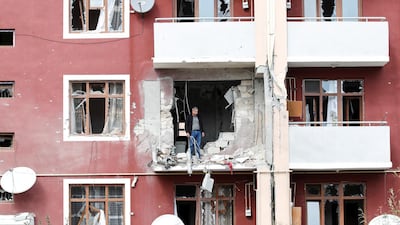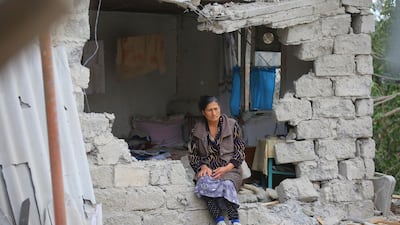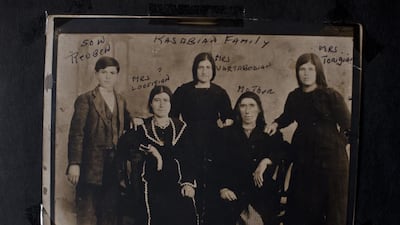The US Congress on Thursday advanced legislation that could hinder Azerbaijan’s multimillion-dollar military assistance packages that it has received yearly since 2002.
The powerful Appropriations Committee in the House of Representatives voted 32-25 along party lines to advance its annual foreign aid spending bill, which seeks to increase restrictions on Azerbaijani military aid by placing it within the context of the significantly smaller security assistance packages that Armenia typically receives.
The report accompanying the bill notes that “the committee is concerned by disparity in military assistance provided to Azerbaijan in comparison to Armenia".
The legislation would require Secretary of State Antony Blinken to consider “the military balance between Azerbaijan and Armenia and the diplomatic consequences of such disparity in military assistance” when issuing next year’s waiver to allow Azerbaijan to receive US security assistance.
Data compiled by the Centre for International Policy’s Security Assistance Monitor indicates that Washington provided Azerbaijan with over five times more military aid than Armenia in fiscal year 2019: about $45 million for Baku versus about $8m for Yerevan.
Congress first blocked military aid to Azerbaijan following its first war with Armenia over the disputed Nagorno-Karabakh territory. However, Congress passed legislation in 2001 that allowed the State Department to issue a waiver allowing Baku to receive military aid as tension mounted between Azerbaijan and neighbouring Iran over energy exploration in the Caspian Sea.
But the second conflict over Nagorno-Karabakh last year, which resulted in Azerbaijan once again seizing control of the territory with Turkish support, has drawn renewed scrutiny over US military aid to Baku among Armenia’s numerous allies in Congress.
The Armenian National Committee of America vocally condemned Mr Blinken's decision to issue the waiver for Azerbaijan to receive military aid in April. The waiver stipulates that the military assistance to Azerbaijan will not contribute to conflict in the region.
Lobbying disclosure records reviewed by The National indicate that the Armenian National Committee of America spent $30,000 lobbying Congress on several issues in January through March of this year, including on the foreign aid spending bill that includes the language focused on military aid to Azerbaijan.
“We welcome the US House report language as a first step towards rolling back President Biden’s reckless waiver … and stopping all US arms and aid to the oil-rich, racist and openly anti-Armenian Aliyev regime,” Tereza Yerimyan, the government affairs director for the Armenian National Committee of America, told The National.
“Not a single US tax dollar should ever be shipped to the Azerbaijani military to kill, cripple or capture Armenians.”
But Aykhan Hajizada, a political counselor for the Azerbaijani embassy in Washington, characterised the efforts as "misleading lobbying efforts in Congress to undermine America's partnerships around the world" that do not help Armenia "reach a lasting peace with neighbours and propserity in the South Caucasus."
"Azerbaijan and the United States enjoy a robust bilateral partnership, including in the areas of defence and security," Mr Hajizada told The National. "This partnership benefits both our nations and the wider region and contributes to global peace. Azerbaijan's role as a force contributor to the operation in Afghanistan and its key role as a unique transit route are just some of the examples."
The Armenian National Committee of America in April called on members of Congress to sign on to a letter to the foreign aid panel urging its powerful members to suspend security aid to Azerbaijan. The letter was spearheaded by Democrats Frank Pallone of New Jersey as well as Jackie Speier and Adam Schiff of California — the three co-chairs of the Congressional Armenian Caucus.
Democrat Barbara Lee of California, the chairwoman of the foreign aid spending panel that initially placed the provision on Azerbaijani military aid in the legislation, is also a member of the Congressional Armenian Caucus.
Two other members of the foreign aid panel — Democrat Grace Meng of New York and Republican Jeff Fortenberry of Nebraska — are also members of the caucus.
The Congressional Armenian Caucus exercises considerable clout in Congress. It has more than 120 members in the House of Representatives, reflecting the hundreds of thousands of Armenian Americans residing throughout the US.
Conversely, the Congressional Azerbaijan Caucus has only 10 members, led by Democrat Steve Cohen of Tennessee and Republican Steve Chabot of Ohio.
As such, Mr Cohen and Mr Chabot faced tough odds when they launched an opposition letter calling on the foreign aid panel to support Azerbaijan in the spending bill and route all US assistance to Nagorno-Karabakh through Baku.
They cited Azerbaijan’s role as a counter-terrorism partner with Israel and as a supply route to US forces in Afghanistan as well as Russia’s support for Armenia in their failed appeal to the foreign aid panel.
Azerbaijan’s lobbyist in Washington, BGR Government Affairs, promoted the letter, but Baku seems to have lost this particular battle.
















